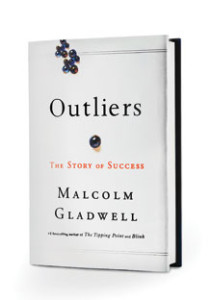 This article was originally published on April 10th 2009. If you haven’t read Malcolm’s stuff yet – go read it! You won’t be disappointed. The 10,000 hour idea that he popularized only holds up for mastering in highly-competitive fields and doesn’t translate to most activities (watch this TED talk on how long it really takes to learn a skill). Still, it’s great food for thought.
This article was originally published on April 10th 2009. If you haven’t read Malcolm’s stuff yet – go read it! You won’t be disappointed. The 10,000 hour idea that he popularized only holds up for mastering in highly-competitive fields and doesn’t translate to most activities (watch this TED talk on how long it really takes to learn a skill). Still, it’s great food for thought.
Malcolm Gladwell has an uncanny ability to pick a small, below-the-radar aspect of human experience and use it as a jumping off point for an exploration of how our brains work. In doing so, he usually goes well beyond the initial topic and invariably ends up creating a broad, but interconnected, web. In the Tipping Point and Blink he looked at how ideas spread and how we make split-second decisions, in Outliers Malcolm examines the stories of why individuals become ultra-successful in different fields of endeavor.
Big Thought
For individuals who are massively successful in their field, the outliers, there is more to the story than just personal attributes. They are able to excel to the highest level because of a unique confluence of social constructs, cultural environment, historical accident, and personal upbringing and experience.
Ideas, Implications, and Questions
- Malcolm presents the outliers as people who have dedicated a great deal of time to their craft – using Bill Gates and the Beatles as examples. The number that he reports as the magic amount of practice needed to achieve true mastery is 10,000 hours (pg. 47). This is an interesting juxtaposition to the idea of the prodigy or genius who just “gets it” and spends very little time honing their skills. Even if we aren’t looking for complete mastery of a subject (i.e. spending 10,000 hours on it), do we hamper our success by not devoting enough time to learning it? Do we give ourselves and those around us enough time to practice and gain competence?
- “People don’t rise from nothing. We do owe something to parentage and patronage . . . It’s not enough to ask what successful people are like, in other words. It is only by asking where they are from that we can unravel the logic behind who succeeds and who doesn’t.” (pg 19) Context counts!
- In American culture, the focus on the individual has led to the mythology of the self-made man (or woman). People who are successful are often viewed as islands, as paragons of individual virtue. We see time and time again, though, that this is far from the case, that even the most rugged individuals have direct and indirect help from others. Even though it’s a paradox, if we were able to accept as a society that it’s possible (even necessary) to be successful as an individual by getting help from others, there would probably be a lot more successes. This is one of the most important ideas of the book, that “because we so profoundly personalize success, we miss opportunities to lift others onto the top rung.” (pg 32)
- I think Malcolm goes out on a limb a bit when he suggests that culture and language can affect something like mathematical skill. As he looks at the stereotype that Asians are better at math, he examines the testing scores that show it is indeed true, and he looks at evidence that supports that idea of this success being cultural. I think that the argument can be stretched too far, but at its core, it’s sound. I think that there may be parallels in the challenges in trying to install democracies in the Middle East – in places where there is no cultural context or history for doing so.
- There is a commonality between what Malcolm writes about and Nassim Taleb’s idea of the “Black Swan”. Just as Nassim puts a lot of power in the forces of chance, so too does Malcolm hint that sometimes what is needed to be massively successful is the luck to be the right person, with the right background, at the right place, at the right time. It seems contrary to our thinking considering that we are steeped in the idea that the individual is responsible for their own success, but it also can be very illustrative of why some people succeed and others don’t.
Should you read this book?
Yes! I think that all of Malcolm’s books are a great source of information about how we operate as individuals and as a society – and for that reason they are a great inspiration to personal contemplation. By contrasting our cultural views of success with some of the hidden steps to be a top performing individual, Outliers frees us from an external and somewhat false concept of the path towards success and happiness. This then allows us to pursue our success on our own terms, as well as help others along the way to theirs.
